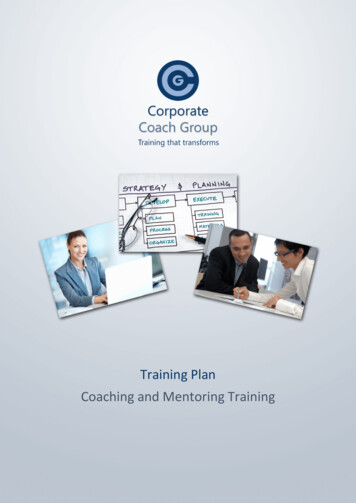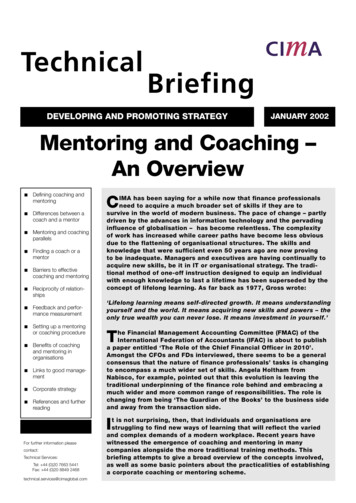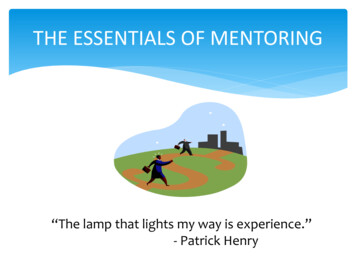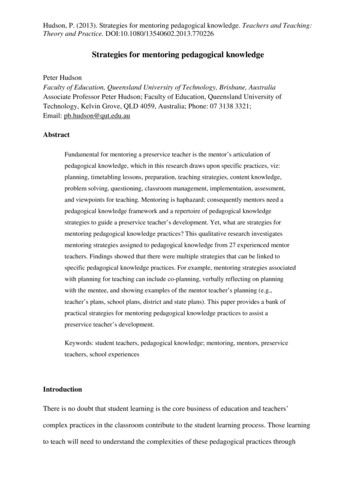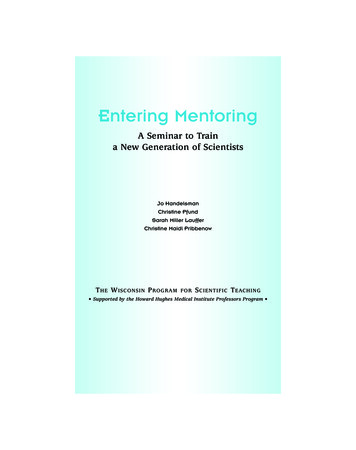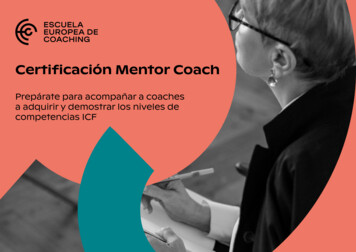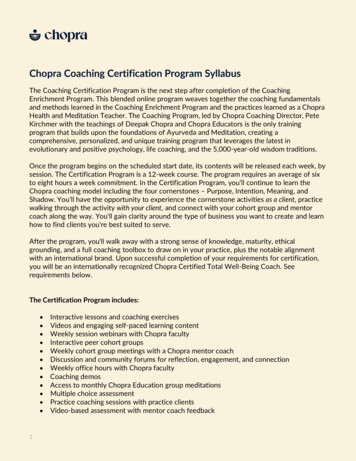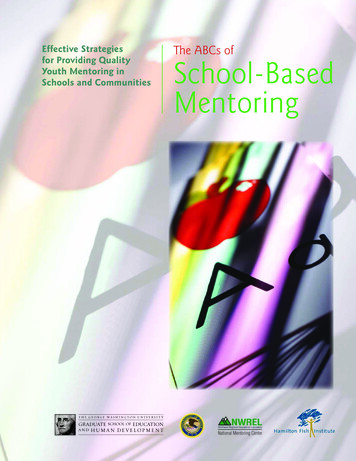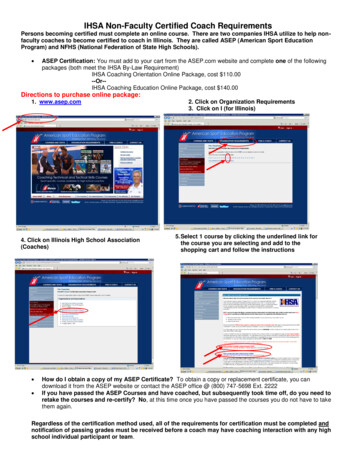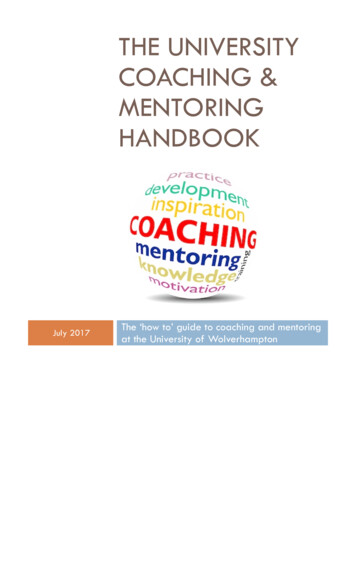
Transcription
THE UNIVERSITYCOACHING &MENTORINGHANDBOOKJuly 2017The ‘how to’ guide to coaching and mentoringat the University of Wolverhampton
The University Coaching &Mentoring HandbookT H E ‘ H O W T O ’ G U I D E T O C OAC H I N G A N D M E N T O R I N G AT T H EUNIVERSITY OF WOLVERHAMPTONCONTENTS 17.18.19.20.21.22.Welcome (to be added by the Faculty)Overview of the programme with timetable (to be added by the Faculty)Coaching, mentoring and buddying definitionsDifferences to counselling and teachingBenefits of coaching and mentoring/why bother?Key roles and responsibilities/boundariesKnowledge, skills and attitudes of mentors/coachesWhat makes an effective mentor/coachKnowledge, skills and attitudes of mentees/coacheesCode of professional conduct and ethicsThe mentoring/coaching lifecycle/different phasesPractical hints and tips at each stage/phasePreparing the mentee/coachees – suggestions for getting startedPreparing the mentor/coach – mentoring/coaching modelsImportance of goal setting and PDPsReflective practice and the importance of SupervisionFeedback giving and receiving – hints and tipsFAQ and answersSuggested readingHelpful diagnostics/resources that mentors/coaches could useImportant contact details (to be added by the Faculty)Example paperwork (to be added by the Faculty) includingcoaching/mentoring contract, meeting templates, 3 monthly review sessionsheets
3. Coaching, mentoring and buddying definitionsDEFINITIONS OF COACHINGMore traditional views of (on-the-job/performance type) coaching:‘Coaching is the process whereby one individual helps another; to unlock their naturalability; to perform, learn and achieve; to increase awareness of factors which determineperformance; to increase their sense of self responsibility and ownership of theirperformance; to self-coach; to identify and remove internal barriers to achievement.’MacLennan (1999)‘Generally speaking, what coaches do is anchor people to their own internal strengths;they inspire organizations to dream beyond their plans. They apply emotional andintellectual intelligence to the long haul of life and work coaches must be very specialpeople They must be able to transcend their own ego needs so that they can help othersin unselfish ways. Finally, coaches must be selected and trusted by clients as highly reliablelearning resources.’ Hudson (1999)‘Coaching is the art of facilitating the performance, learning and development of another.’Downey (2003)‘Unlocking a person’s potential to maximize their own performance. It is helping them tolearn rather than teaching them.’ Whitmore (2003)‘Ultimately coaching aims to bring out the best in an individual to enable the team to workbetter as a whole. The same can be said of business and its leaders.’ IoD (2013)Different types of coaching (taken from the Association for s/about/coaching-defined):Personal/Life Coaching – ‘A collaborative solution-focused, results-orientated andsystematic process in which the coach facilitates the enhancement of work performance,life experience, self-directed learning and personal growth of the coachee.’Executive Coaching - ‘As for personal coaching, but it is specifically focused at seniormanagement level where there is an expectation for the coach to feel as comfortableexploring business related topics, as personal development topics with the client in orderto improve their personal performance.’Corporate/Business Coaching - ‘As for personal coaching, but the specific remit of acorporate coach is to focus on supporting an employee, either as an individual, as part ofa team and/or organization to achieve improved business performance and operationaleffectiveness.’Speciality/Niche Coaching - ‘As for personal coaching, but the coach is expert inaddressing one particular aspect of a person’s life e.g. stress, career, or the coach isfocused on enhancing a particular section of the population e.g. doctors, youths.’Group Coaching – ‘As for personal coaching, but the coach is working with a number orindividuals either to achieve a common goal within the group, or create an environmentwhere individuals can co-coach each other.’
DEFINITIONS OF MENTORINGMentoring is a slippery concept (Daloz 1986) and as such definitions vary with respect todiffering dimensions such as hierarchy, intensity, duration and partnership (Gibson 2004)and according to national and cultural traditions. It also depends on which continent youare mentoring within!Here are some US definitions:In the US, mentoring typically takes a sponsorship approach;‘Mentoring is considered to be an interpersonal exchange (often career orientated)between a senior person and a junior, where the mentor will guide, teach, share theirexperience and wisdom.’ O’Brien (2003)‘Mentoring is (the) process whereby one senior individual is available to a junior; to form anon-specified developmental relationship; to seek information from; to regard as a rolemodel; to guide the performer; to provide feedback and appraisal; to teach all the factsthat will enable the individual to perform effectively in an organisation.’ MacLennan(1999)‘A mentor is someone who passes on his or her experience and wisdom by coaching,counselling, guiding or partnering in every possible permutation, from volunteer tutor toangel investor.’ O’Brien (2003)Here are some UK/European definitions:Within the UK and Europe, a more developmental approach is evident;‘Mentoring is help by one person to another, helping others to achieve various personaloutcomes, specifically those related to career success.’ Gibson (2004)‘Mentoring is off-line help by one person to another in making significant transitions inknowledge, work or thinking.’ Clutterbuck (2004)‘Mentors are people, who through their action and work, help others to achieve theirpotential.’ Shea (1992)‘A process which supports learning and development, and thus performance improvements,either for an individual, team or business.’ Parsloe & Wray (2000)Similarities between coaching and mentoringWhen all this theory and confusion between continents is stripped away, however,mentoring is still simply about a regular one-to-one meeting to support the learner in theirdesire to improve their personal situation, their work life and their future.As such it has some similarities to the other learning interventions of coaching, buddying,counselling and teaching (see table in section 4).The Coaching and Mentoring Network state that ‘coaching and mentoring are processesthat enable both individuals and corporate clients to achieve their full potential’ (C&MN2005) and they argue that the common thread that unites both types of service, are thatthey offer a vehicle for analysis, reflection, learning and action that ultimately enables theclient to achieve success in one or more areas of their life or work.
Here is the EMCC (European Mentoring and Coaching Council) definition for both;‘Coaching and Mentoring are developmental activities within relationships based on trustand established through conversations. These activities aim to develop the personal orprofessional competencies of the client. The focus is on the individual or the team and theresources and solutions they generate for their specific personal or professional context.’(EMCC 2013)Many of the attributes of both interventions are interchangeable depending on the needsof the coachee/mentee and skills of the coach/mentor. It is widely accepted however that:· Mentoring is a longer term relationship than coaching.· Coaching can be a single session/agreed programme of sessions with plannedoutcomes.· Mentors are usually more experienced at working in the same or a similarorganisation/situation, they possess knowledge, skills, networks and experienceuseful to the mentee.· Coaches can be drawn from different levels within or outside the organisation astheir approach requires specific skills in coaching rather than expertise in a field· The holistic nature of mentoring, particularly in its traditional sense, distinguishes itfrom other learning or supporting roles, such as coaching, which is goal focused.Taken es/2a 2512011 microsoft word coaching and mentoring 3.pdfDEFINITIONS OF BUDDYINGBuddying is normally a more informal relationship, often between students.‘a friend, comrade, or partner; chum.’ OED‘a buddy is a close friend or a pal. An example of your buddy is your friend withwhom you go and get a beer.’ www.yourdictionary.com‘It is important to understand the difference between a workplace buddy, coachand mentor to ensure the right support is provided and roles are not confused – A workplace buddy is solely involved in providing one-point of access tonecessary information, helping the individual to understand the organisationalculture, and settle into the workplace.– A coach is someone tasked with developing an individual's job-specific skills.–A mentor seeks to assist the individual with their development, bothpersonally and professionally.’ OCPEhttp://www.ocpe.nt.gov.au/building capability/building workforce capacity/buddying/what is a buddySo what are the definitions for your Faculty?TAKE ACTION - Ensure you are really clear on these and the purpose ofthe scheme you are going to be involved in, before you get started!
4. Differences to counselling and teachingSimilarities & differences between the key ‘helping’ CoachingBuddying ProfessionalCounsellingPersonalSpecificAct as aExploredevelopment task/skills/ friendpersonalissues fromand growth actionpast andorientatedpresentFutureTask/skill SupportIndividualTransfer of newskills,knowledge,behavioursNew skill,knowledge orbehavioursTypically ingroupsTeacher/LecturerUniversity/HEATo teach specificknowledge, skillsand behavioursfor nteeGoals set by MenteeKey actions Listen andbe guidedby thementee –focus tHelp ientEncouragethe client tomake somepersonaldecisionsTimescalesAs neededbasis/shorttermFocus eed setof sessionsShort termFocus onclientCounsellorClient3rd r3rd party?ParentNoLearnersWhobenefits?Who /taskor act/Contract/9-12 months short termTeachingBoth tial? YesKey interests cheeIt is very important to be clear that coaching and mentoring are NOTcounselling.Coaching/mentoring/buddying are not the place to discuss counsellingneeds.If you feel that this is what your coachee/mentee/buddy needs, rememberthere are other University support services to help them.TAKE ACTION – review the University Student Support pages for furtheradvice https://www.wlv.ac.uk/study-here/student-support/
5.Benefits of coaching and mentoring/why bother?The benefits for the coachee/mentee/student/colleagues: A chance to discuss issues, blockages and/or concerns in your careerdevelopment Having someone (other than friends/colleagues/tutors) available to sharedifficult situations Having someone to believe in you and your ability Being given help to work out what it is you want from life and work Being given help to develop a greater confidence Learning to cope with the informal and formal structure of your future Working through tactics to manage relationships with other people Becoming more comfortable in dealing with people from unfamiliarbackgrounds Learning how to communicate with others in more senior positions Making sense of feedback from others and deciding how to deal with it Being given the opportunity to challenge thinking and be challenged in return Being given the opportunity to receive career advice (and possibleenhancement) Gaining an insight into management processes Having someone else to act as a ‘conscience and a guide’ Obtaining opportunities to network, visibility (access to senior managementthinking)The benefits for the coach/mentor: A chance to discover and work with colleagues/students from a differentviewpoint An opportunity to share their knowledge, skills and experience The satisfaction of knowing that they have made a difference to someoneelse The huge amount of personal learning that can be taken from the experience The opportunity to create some reflective space in a hectic daily workschedule The intellectual challenge of working on issues that they do not have directpersonal responsibility and that may take them into unfamiliar territory An increased skills base, credibility and reputation
A chance for them to re-assess their own views and leadership style A chance to become more aware of other’s views/a source of challenge toone’s own thinking The chance to broaden their perspective/collect others views – anopportunity to view the world with fresh eyes, to understand what others aregoing through By explaining/sharing/exploring best practice concepts to others, may helpto reinforce them once more for themselves A chance to challenge and be challenged - mutuality Taking pride in the mentees/coachees/students/colleagues achievements Learning new ways to support and develop others
6Key roles and responsibilities/boundariesTypically, there are a minimum of 3 people involved in a coaching and/or mentoringprogramme; the coachee/mentee, the coach/mentor and the Programme/Scheme Coordinator. (In the workplace, often Line Managers are involved too.) Each has their owndiffering roles and responsibilities within the relationship.Key roles & responsibilities of coaches/mentors: Agree and keep to a mentoring/coaching contract Meet with mentee/coachee when agreed – please try to ensure you keepyour appointments Establish and build on rapport throughout the relationship Diagnose the needs with the mentee/coachee and agree priorities (driven bymentee/coachee) Improve the mentees/coachees breadth of knowledge and skills Share broader perspective of organisations, culture, strategy Help mentees/coachees to articulate their aspirations and then realise theirpotential Prompt mentees/coachees to draw up their own personal development plans(PDPs) Recognise and celebrate achievements Confront and reflect on positive and less positive behaviours/habits/attitudes Encourage the mentee/coachee to think beyond the obvious Encourage and motivate the mentee/coachee Ensure confidentiality as agreed with mentee/coachee Manage time commitments Initiate reviews of progress at regular intervals Be open and honest at all times Provide contacts/networks for them to follow up (if appropriate) Prompt them to keep others updated on progress (i.e. Personal Tutors, ifappropriate) Not discuss with others directly (unless agreed with the mentee/coachee first) Advise when other support is available (outside own boundaries) e.g.Counselling Attend appointed update/supervision/CPD sessions to share and evaluateongoing learning Identify when the relationship may need to close
Manage feelings/emotions when closing down the formal relationship Keep in touch beyond formal relationship/take a continuing interestKey roles & responsibilities of coachees/mentees: Meet with mentor/coach when agreed to (please don’t cancel) Define and agree expectations for the relationship Agree how best to manage the mentoring/coaching contract(mentee/coachee is in control) Take responsibility for drawing up their own personal development plans Commit to completing agreed development tasks i.e. completing diagnostics,creating a PDP Access other sources of advice and information as appropriate Share information about their strengths, development needs, ambitions etcopenly with their mentor/coach Initiate their own development and make the most of learning opportunities Be open and honest with self and mentor/coach Ensure confidentiality, as agreed with mentor/coach Attend any update/CPD/training sessions to share and evaluate ongoinglearningKey roles & responsibilities of the Programme/Scheme Co-ordinator: To ensure the smooth running of the scheme To ensure commitment from both parties Formal link between all interested parties Managing the publicity for the scheme Managing the recruitment and selection of mentors/coaches andmentees/coachees Ensuring the criteria for mentee/coachee selection is very open and availableto all Ensuring the criteria for mentor/coach selection is very open and available toall Arranging initial briefings and follow up support for both mentors/coachesand mentees/coachees Organising regular update/supervision/CPD sessions to monitor/evaluateongoing learning
Ensuring both parties are clear about their roles and responsibilities Organising specific training for mentors/coaches Organising refresher training for mentors/coaches on a yearly basis Organising ‘expectations’ group induction session with mentees/coachees Maintain the records/database of all involved Administering the matching process and any reassignments that might beneeded Ensuring the programme is regularly monitored and reviewed Managing the associated budgets and quality control processes Being the public face of the programme to stakeholders inside and outsidethe organisation To provide a ‘ready ear’ to all participants to ensure productive relationships Review best practice and use benchmarked good practice forredesigning/refreshing the scheme To demonstrate return on investment to the key stakeholdersIMPORTANCE OF RELATIONSHIP BOUNDARIESIt is very important to be clear about the boundariesAs a mentor or coach you need to give some thought to what you will andwon’t do and what you will and won’t cover with your mentee/coachee, inthe sessions. This is normally agreed as part of a coaching/mentoringcontract.Check if the scheme you are on has a contract and if so, ensure this issomething that is discussed (and signed) at the first meeting. It is veryimportant that both parties are clear about the boundaries of therelationship, from the start. It is a good reference point to come back tolater, within the relationship, as well.TAKE ACTION – Check the paperwork for the scheme in your Faculty andask about the coaching/mentoring contract that you will need to use.
7.Knowledge, skills and attitudes of mentors/coachesIdeal characteristics when looking for a mentor/coach: Has a genuine interest in seeing people advance and can relate to theirproblems Already has a track record of developing people Has a wide range of current knowledge, skills and experience to pass on Has a good understanding of the mentees/coachees context Combines patience with good interpersonal and communication skills Has sufficient time to devote to the relationship Can command a mentees/coachees respect Has his/her own network of contacts and influence Is still keen to learn themselvesAccording to the Zurich Mentoring Guide 2005 (as cited in Cranwell-Ward et al 2005)mentors/coaches need: Relevant job-related experience Well-developed interpersonal skills An ability to relate well with people who want to learn A desire to help and develop others An open mind, flexible attitudes Recognition of their own development needs and need for support Time and willingness to develop relationships with mentees Experience of facing difficulties, new challenges, being helped themselves,working with others, achieving/failing, taking responsibility and dealing withstress
What should mentors/coaches do?Mentors/coaches should have the skills to; Help build self confidence Set high performance expectations Offer challenging ideas Encourage professional behaviour Offer support and friendship Confront negative behaviours and attitudes Listen to personal issues (but be careful of boundaries) Share examples, information and resources Help far beyond their duties or obligations Stand by their mentees/coachees in critical situations Offer wise counsel Provide tailored, accurate and regular feedback Encourage winning behaviour – role model behaviour Trigger self awareness & encourage reflection (for mentee/coachee andthemselves) Be sensitive to the day to day needs Inspire to excellence Share critical knowledge Offer encouragement Stimulate creative thinking Recognise and reward positive change in behaviour Help to deal with grey areas Self disclosure/share own experiences and career decisions made Encourage to use own networks, mentors/coaches networks and/or othersupport available
In summary, mentors/coaches should have: a genuine care for the development of people/ready to spend time andthought on coaching and mentoring activities commitment to the work and success of the relationship knowledge of processes/knowledge of how things happen/knowledge ofwhere to get help a strong respect for self and others and great patience a desire to create and work in a relationship of trust and confidentiality onboth sidesIn short, what do MENTORS actually do? Manage the relationship Encourage Nurture Teach the mentee to help themselves Offer mutual respect Respond to the mentees needs Support at all timesIn short, what do COACHES actually do? Consider the coaches needs at all time Offer support and encouragement Ask questions Challenge Hold the coachee to account/ensure goals are set Encourage/enable See goals through to the (agreed) end
Unhelpful coach/mentor behaviours: Not turning up for meetings/cancelling meetings/not showingthis is a priority for you Criticising & being judgemental Telling what to do/giving advice/talking at them Solving the problems for them Asking closed questions Making assumptions/taking actions on behalf of thementee/coachee Interfering and intervening on behalf of thementees/coachees Discussing mentee/coachee with the Programme/SchemeCoordinator Agreeing to do something and not carrying this through Giving false information, having an alternative agenda Talking about how it was in ‘your day’ or ‘what works for you’TAKE ACTION – Have a good look at the various lists ofknowledge/skills/behaviors expected by a mentor/coach on the next fewpages and make a note about your strengths and development needs inrelation to these. Hopefully, you can be assured you are the right personfor the job but if you need any extra help, ask your Faculty for the nextcoach/mentor training dates and/or for details of the additional supportthey or the wider University can offer you.
8.What makes an effective mentor/coachA summary of what makes an effective mentor/coach (from mostly businessliterature)Behaviours expected of an effectivementor/coach Challenge assumptions Encourage learner to widen own view Happy for ownership/direction to bewith learnerSkills expected of an effectivementor/coach Communication skills/reinforcerapport Listening/use of silence Information seeking/questioning Accept ambiguity Guiding/suggesting Patience Encouraging Honest/trustworthy Stimulating Genuine interest in developing others Confidence building Self motivated Challenging (non-judgemental &supportive) People orientated Committed to own learning Time & willingness to devote torelationship Talk less than 20% of the time Good sense of humour Offer mutual respect Ability to relate well to others whowant to learn Sharing Encouraging Goal clarity/goal setting/actionplanning Motivating Nurturing Teaching/training Good organisational skills An open mind Coaching/Counselling Flexible attitude Facilitating Recognition of own need for support Ability to read and understandothers Enthusiastic/Positive in outlook Drive and energy Committed to the process Having values, trust andintegrity/honest Approachability Willingness to share Be prepared to give the learnerspace Sounding board Open & transparent Creative Summarising Well developed interpersonalskills Supportive Evaluating/Reflecting FeedbackKnowledge expected of an effectivementor/coach Knowledge of organisation andindustry Conceptual modelling/mentoringtheory
Visible Business/professional savvy Strategic Relationship management Friendly & kind Give considered advice/shareknowledge Understanding & empathetic Dedicated Compassionate Confident/assertive Hold back from giving ownexperience Self awareness/understanding others Functional expertise Knowledge of organisationsstrategies/culture Knowledge of the people & accessto networks/influence Knowledge of context in whichbusiness operates/organisationalcontext Range of experience and varietyof workplace skills High levels of expertiseGOOD COACHES/MENTORS KNOW WHEN TO SUPPORT AND CHALLENGEThe support and challenge model (Taken from: Connor & Pokora 2007 p.182.)Mentors/coaches and mentees/coachees should expect to challenge and be challenged,and to support and be supported, but the relationship between these 2 areas will shiftover time i.e. it may be in the early meetings the focus is more on ensuring support andless challenge (bottom right hand quadrant in the figure above) but the idea is that as therelationship progresses, the mentee/coachee is supported less but challenged more (topright hand quadrant in the figure above).Ideally the mentee/coachee should be able to leave the relationship fully independent ofthe mentor/coach and able to move on without them; increasing the challenge over time, isa way to ensure this happens. If your mentoring/coaching relationship is stuck in the lowsupport and low challenge quadrant, this may not be mentoring but just a cosy chat!!
9.Knowledge, skills and attitudes of mentees/coacheesMentees/coachees need to Understand the programme objectives/purpose and process Be self motivated Be able to articulate expectations and own objectives Meet commitments Accept feedback and act on it Listen Be self-aware Have the ability to reflect Be open Willing to engage in meaningful feedback Trustworthy Receptive to and able to benefit from legitimate challenges Not a passive receiver but an active partner in the process Ambitious with aspirations to go further Realistically ambitious about their expectations of the programme Strong interpersonal skills Prepared to take responsibility for their own actions Able to approach the relationship with respect, good humour and openness High belief in their ability to influence events in their favourSimilarity and differenceIt is not necessary for mentors/coaches and mentees/coachees to havesimilar personalities, similar learning styles or similar backgrounds in orderfor the relationships to be successful. In fact, there is often more learning tobe had between both parties if they think differently and approach tasksdifferently; allowing for a different perspective to be debated betweenthem.
10.Code of professional conduct and ethicsThere are a number of membership bodies which have created professional standards forcoaching and mentoring, depending on their context. The EMCC (The EuropeanMentoring and Coaching Council) is the only one in the UK that covers both coaching andmentoring. It has been established to promote best practice and ensure that the highestpossible standards are maintained in the coach/mentoring relationship. This is themembership body that the University of Wolverhampton subscribes to and the expectationis that all coaches/mentors who operate within the University are aware of thesestandards and adhere to their professional code. Recently (2016) the EMCC teamed upwith AC (The Association for Coaching) to develop a ‘Global Code of Ethics.’ This code ofethics is arranged into four sections and covers the bodies’ general expectations ofprofessional behaviour and conduct:1. Terminology2. Working with Clients3. Professional Conduct4. Excellent PracticeMore details about the EMCC and AC Global Code of Ethics can be found ownload/4.pdfMore details about the EMCC can be found on this link;http://www.emccouncil.org/More details about the AC can be found on this ome/A short snippet from the EMCC/AC code in relation to ‘Professional Conduct’ is below:Maintaining the reputation of coaching and mentoring3.1 Members are expected to behave in a way that at all times reflects positively upon,and enhances the reputation of, the coaching and mentoring profession.3.2 Members will demonstrate respect for the variety of coaches, mentors and otherindividuals in the coaching and mentoring profession and for the different approaches tocoaching and mentoring.Recognising equality and diversity3.3 Members will abide by their respective bodies’ diversity statements and policies.3.4 Members will avoid knowingly discriminating on any grounds and will constantly seekto enhance their own awareness of possible areas of discrimination.3.5 Members will be cognisant of the potential for unconscious bias and seek to ensurethey take a respectful and inclusive approach that embraces and explores individualdifference.3.6 Members will challenge in a supportive way any colleagues, employees, serviceproviders, clients or participants who are perceived to be using discriminatory behaviour.3.7 Members will monitor their language, spoken, written and non-verbal, for inadvertentdiscrimination.3.8 Members will engage in developmental activities that are likely to increase their selfawareness in relation to equality and diversity.
THERE ARE OTHER ACCREDITING/MEMBERSHIP BODIES FORCOACHING AND MENTORING.FOR FURTHER INFORMATION, PLEASE ALSO ItemNumber 854 - UKInter
7. Knowledge, skills and attitudes of mentors/coaches 8. What makes an effective mentor/coach 9. Knowledge, skills and attitudes of mentees/coachees 10. Code of professional conduct and ethics 11. The mentoring/coaching lifecycle/different phases 12. Practical hints and tips at each stage/phase 13.


